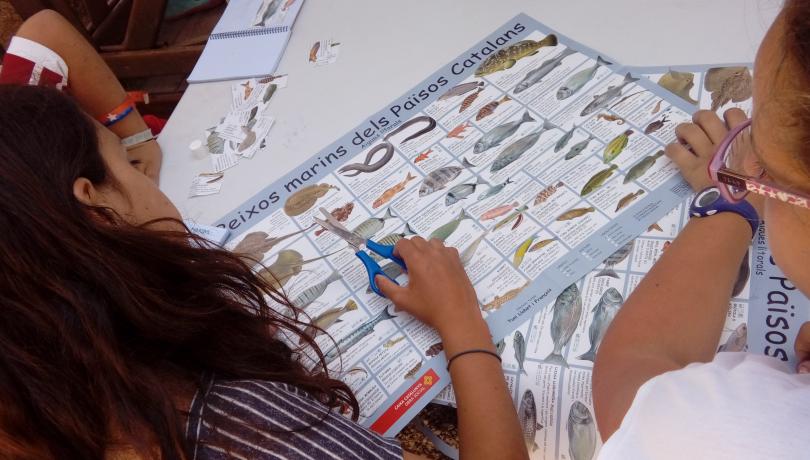ProBleu will expand and support the Network of European Blue Schools, providing new educational resources and grants to over 100 European schools and associated countries.

The European Union's Mission, "Restoring Our Oceans and Waters," one of the pillars of the Horizon Europe research programme, aims to protect and restore the health of aquatic ecosystems (seas, oceans, and continental waters) through research, innovation and citizen participation. This Mission will play a key role in achieving climate neutrality and restoring aquatic ecosystems.
In this context, the international European project ProBleu is born, which will expand and support the Network of European Blue Schools, created in 2021 to bring ocean knowledge into classrooms.
ProBleu is coordinated by the Institute of Marine Sciences (ICM-CSIC, Barcelona) and includes five more partners working together to ensure ProBleu's goal: Kaunas University of Technology (KUT, Lithuania), INOVA+ (Portugal), Earthwatch (United Kingdom), Plymouth Marine Laboratory (PML, United Kingdom), and National Marine Aquarium (OCT, United Kingdom).
A Network of Over 100 Schools
Throughout the 3-year project, ProBleu will launch various calls for proposals through its website, where at least 100 European schools and associated countries will benefit from financial resources to develop different educational and citizen science projects. The project aims to adapt resources to as many languages as possible, including some of the minority languages in Europe.
First Grant Call in November
Educational institutions can apply for grants of up to €10,000 for projects lasting up to 12 months. The first round of funding is expected to open in November 2023. Still, interested schools can register now in this form to receive information as soon as the call is published.
In addition to these calls, ProBleu will create an educational resource catalogue for teachers. All resources and tools will complement each other, fostering a connection between school communities and local environmental challenges. Furthermore, ProBleu will assist schools in developing local project activities, integrating the results into global research products related to the European Union's Mission "Restoring Our Oceans and Waters."
"We will promote the integration of two key resources into school curricula: firstly, we aim to establish greater interaction between school activities and various research projects, strengthening the link between school activities and science," says Luigi Ceccaroni, Principal Investigator at Earthwatch, another entity participating in the project.
"Secondly, we will promote innovative educational resources, including those related to what is known as 'citizen science,' with teachers working together with social groups to foster a scientific mindset, enabling society to address complex modern problems related to ecosystem sustainability," adds Jaume Piera, Principal Investigator at ICM-CSIC and project coordinator.
The initiative will develop a set of educational resources and tools based on Open Schooling methodologies to open up schools to society, collaborating with various institutions to impact the school and the community. Open Schooling will also enrich school curricula and pedagogical repertoire and share experiences with local institutions.
The Fundamental Role of Aquatic Ecosystems
The main goal of the European Blue Schools Network is to disseminate the direct impact that aquatic ecosystems, such as seas, oceans, rivers, lakes, and estuaries, have on society's quality of life. These ecosystems are crucial as they provide food resources, significantly contribute to atmospheric oxygen production, and act as climate regulators. Therefore, it is imperative to understand their functioning and actively promote their conservation to counteract the effects of climate change and preserve the valuable biodiversity they house.
Various initiatives have emerged to spread this knowledge, including the "Ocean Literacy" concept promoted by the United Nations (UN) and supported by UNESCO and the European Commission.
In this context, ProBlue goes further by, in addition to addressing ocean literacy, extending its focus to continental ecosystems, including rivers, lakes, and estuaries. It also strengthens the links between the educational and research communities. It introduces citizen science as a fundamental tool to bring knowledge about aquatic ecosystems to society.
Citizen science involves active public participation in scientific research activities, either through intellectual contribution or through various tools and resources. In the specific case of ProBlue, schools will have access to guides, tools, and educational resources, including citizen science resources such as FreshWater Watch monitoring kits and the MINKA platform.
"This innovative approach empowers educational institutions and promotes awareness and citizen engagement in preserving our valuable aquatic ecosystems. ProBlue stands as a beacon of knowledge and commitment on the journey towards a more sustainable future in harmony with our natural environment," said the project's proponents.